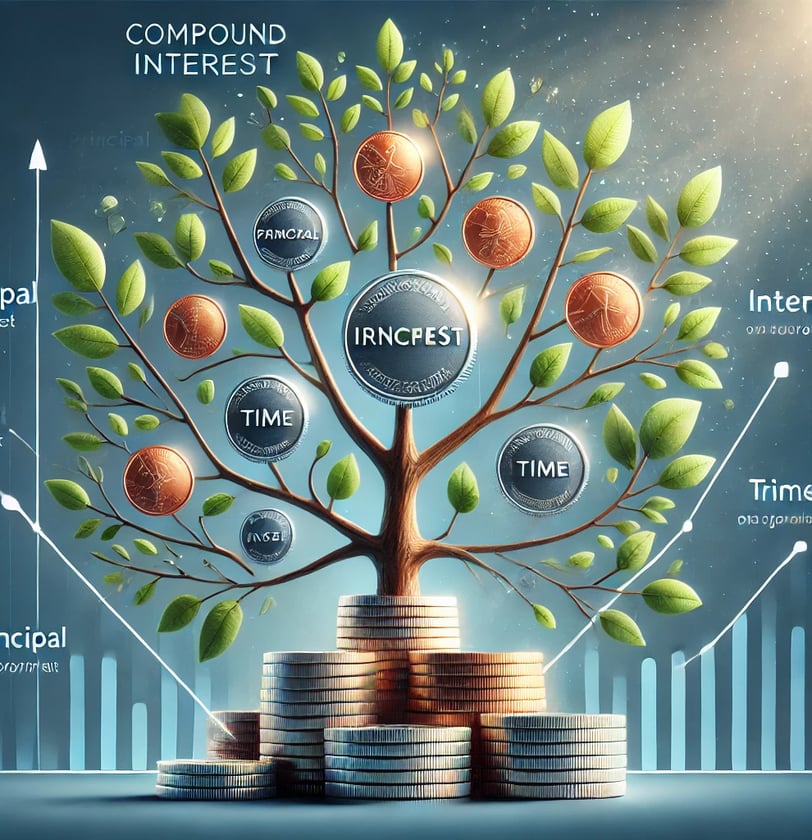Understanding Compound Interest: The Key to Growing Your Wealth
Compound interest is often described as the eighth wonder of the world. It's a powerful financial concept that can significantly boost your wealth over time. Understanding how it works and how to leverage it can make a substantial difference in your investment strategy.
Trent Palumbo
6/27/20243 min read


What is Compound Interest?
Compound interest is the interest calculated on the initial principal, which also includes all the accumulated interest from previous periods. Unlike simple interest, which is only calculated on the principal amount, compound interest grows at an exponential rate. The longer the investment period, the more pronounced the effect of compounding.
How Compound Interest Works
To understand compound interest, let's break it down with a simple example:
Principal Amount (P): This is the initial amount of money you invest or save.
Interest Rate (r): This is the annual interest rate expressed as a decimal.
Number of Times Interest is Compounded Per Year (n): This can be annually, semi-annually, quarterly, monthly, etc.
Time Period (t): This is the length of time the money is invested or saved.
The formula for compound interest is:
A = P[1+(r/n)]^(nt)
Where:
A is the amount of money accumulated after nnn years, including interest.
P is the principal amount.
r is the annual interest rate.
n is the number of times interest is compounded per year.
t is the time the money is invested or saved in years.
For example, if you invest $1,000 at an annual interest rate of 5%, compounded monthly for 10 years, the calculation would be:
A=1000 * [1+ (0.05/12)]^(12×10) = 1000(1+0.004167)^120
=1000(1.647)=$1647
This means your investment would grow to $1,647, with $647 coming from interest.
Benefits of Compound Interest
Exponential Growth: The power of compounding lies in its exponential growth. As the interest accumulates, it starts earning interest on itself, leading to a snowball effect.
Long-Term Wealth Accumulation: The longer you leave your money to compound, the greater your returns will be. This is why starting early is crucial.
Passive Income: Over time, compound interest can become a significant source of passive income, reducing your reliance on earned income.
Strategies to Maximize Compound Interest
Start Early: The earlier you start investing, the more time your money has to grow. Even small amounts can grow significantly over time.
Consistent Contributions: Regularly contribute to your investment accounts to maximize growth.
Reinvest Earnings: Reinvest any interest or dividends earned to take full advantage of compounding.
Choose High-Interest Accounts: Look for accounts or investments that offer higher interest rates and compound frequently.
Real-Life Applications
Savings Accounts: Many banks offer compound interest on savings accounts, making them a safe way to grow your money.
Retirement Accounts: Accounts like 401(k)s and IRAs benefit greatly from compound interest, especially when contributions are made consistently over a long period.
Investment Portfolios: Stocks, bonds, and mutual funds can all compound over time, particularly if dividends are reinvested.
Recommended Reading
For those interested in mastering the art of compound interest and maximizing their investments, check out this book on investment strategies.
As an Amazon Associate, I earn from qualifying purchases. This helps us provide more valuable content for our readers.
Conclusion
Understanding and leveraging compound interest is crucial for anyone looking to build wealth and secure their financial future. By starting early, making consistent contributions, and choosing the right investment vehicles, you can harness the power of compound interest to achieve your financial goals.
Start applying these principles today, and watch your wealth grow exponentially over time. For more insights and tools to aid your investment journey, visit our Market Tools page.
FAQs
1. What is the best way to start investing with compound interest?
Start with a high-interest savings account or a retirement account like a 401(k) or IRA. Contribute regularly and reinvest any earnings.
2. How often should interest be compounded for maximum benefit?
The more frequently interest is compounded, the better. Monthly compounding is often more advantageous than annual compounding.
3. Can compound interest work against you?
Yes, compound interest can work against you with loans and credit card debt, as the interest on unpaid balances compounds over time, increasing the total amount owed.
4. Is compound interest applicable only to financial investments?
No, compound interest can also apply to various financial products, including loans, savings accounts, and investment accounts.
5. How can I calculate compound interest on my own?
You can use the compound interest formula mentioned above, or use online calculators and financial apps to make the process easier.
